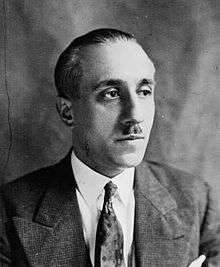Gabriel Péri

Gabriel Péri (Peri) (February 9, 1902—December 15, 1941) was a prominent French Communist journalist and politician, and member of the French Resistance. He was executed by Nazi-occupied France during World War II.
Early life
Péri was born in Toulon to a Corsican family. Forced to give up his studies at an early age. The World War I and Russian Revolution caused deep effect to him in involvement of revolutionary politics. He immersed himself in political activities, and wrote for newspapers in Aix-en-Provence and Marseille.[1]
Career and execution
At the age of twenty-two, Péri became departmental manager of Foreign Politics at l'Humanité. He was elected Deputy for Argenteuil in 1932 and was re-elected in 1936.
In the French National Assembly, Péri distinguished himself as an expert in the field of diplomatic and international relations and was a strident anti-fascist. He denounced both Benito Mussolini's invasion of Ethiopia and France’s non-intervention in the Spanish Civil War. Péri was also a prominent opponent of the Nazi regime in Germany.
After the Fall of France in 1940, the country was placed under Nazi occupation. Arrested on 18 May 1941, Péri was shot later the same year on 15 December at Fort Mont-Valérien. Albert Camus learned of Péri's execution while staying in Lyon,[2] an event which he later said crystallized his own revolt against the Germans.
Tributes
Many schools and streets have been named after Gabriel Péri, as well as a Paris and a Lyon Metro station. Paul Éluard and Louis Aragon wrote poems in his tribute (titled "Gabriel Péri" and "Ballade de Celui Qui Chanta Dans les Supplices" ["Ballad to Him who Sings While Being Tortured"], respectively).
References
- ↑ Margaux MIGNARD. "GABRIEL PÉRI 1902 - 1941". lysias-avocats.com. Retrieved May 16, 2017.
- ↑ Foley, John (2014-12-05). Albert Camus: From the Absurd to Revolt. Routledge. p. 186 citation 51. ISBN 9781317492719.
51 The passage quoted concludes with the following: “And, to be precise, I recall the day when the waves of revolt within me reached their climax. It was a morning, in Lyon, and I had just read in the newspaper of the execution of Gabriel Péri” (first reply to d’Astier, “Où est la mystification?”, June 1948, E: 355-6). Gabriel Peri was a leader of the French Communist Party, executed by the Nazis in December 1941. Cf. Tarrou’s account of the death penalty in TP.
- Lettre d'adieu de Gabriel Péri
- Gabriel Péri: a free and lucid mind
- Works by Gabriel Péri
- Poem of Paul Éluard